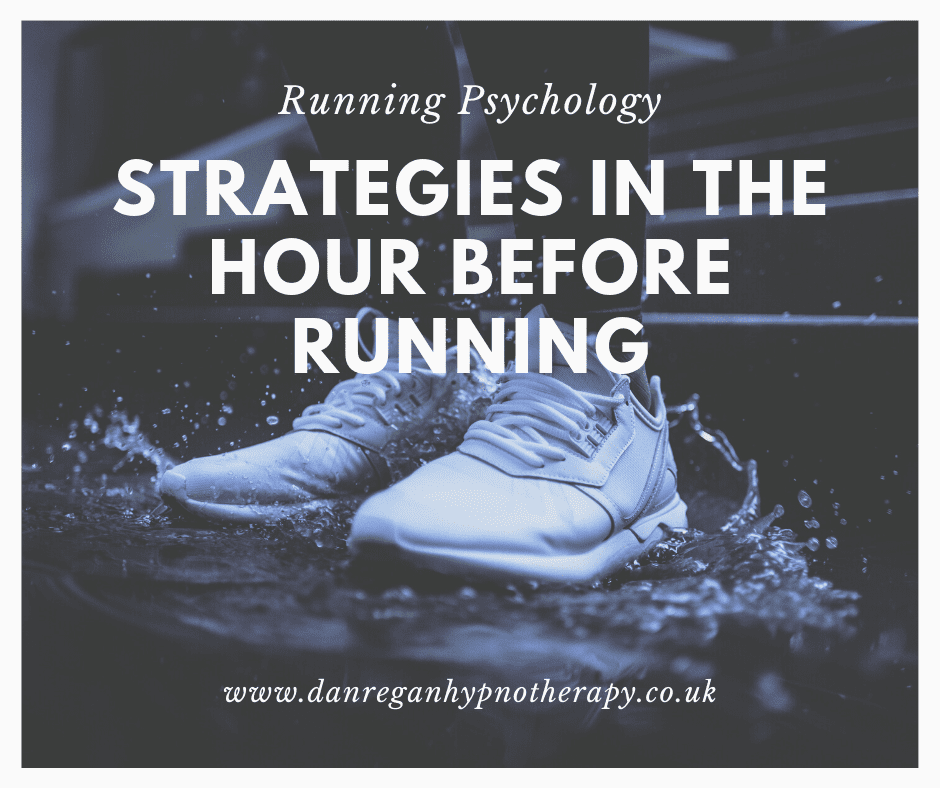Running Psychology: Strategies In The Hour Before Running
I remember when I first started entering a few local, mainly 10km races. I had little idea of what to expect and used to just mill around somewhere near the start and copy some of the warm up routines and strategies from other runners who looked like they knew what they were doing. My training consisted of about three runs a week, totalling ten miles, and I was happy just to jog along in a race, get my medal at the end and enjoy that post-race glow from the satisfaction of finishing. I can still even just about remember doing the ‘Run The World’ 10km in Cardiff way back in the Band Aid days!
Over the years, my pre-run routine, and especially my pre-race routine, has become a bit more refined. To my mind, getting ready to perform to your best involves not only being physically ready but also mentally in the zone. My days of listening to the Rocky theme tune on repeat before a run are long gone, mainly because it used to get me so pumped in the car on a way to a race that by the time I got there I was already tired!
Because I run in the morning these days, my pre-run strategy for a training run involves getting up, moving about and generally getting awake and moving a bit (along with coffee) before warming up and moving out of the door. For a race, I aim to get ready, travel there and then it’s about getting the right level of intensity and focus to race, along with staying relaxed enough to perform as best as I can on the day. It’s all about getting mentally and physically ready so that at the start line, I’m in the zone cognitively and emotionally (I’ve left out the trips to the loo, checking my watch for the time and making sure it has a GPS signal, trying to get my race number on comfortably and tying and retying my laces a few times!).
Of course, all runners have their own routines and strategies in the lead up hour to a run. At any race you can see runners getting ready, some pacing about and others still and composed, some seek company and others prefer solitude, some look lost in thought and others are busy doing warm up exercises. So what sort of running psychology strategies do runners employ before training and competition?
Running Psychology: Managing Your Emotions Before Running
Runners can experience all kinds of emotions before racing or training. There can be emotions such as excitement, joy, anger, dejection and anxiety before running (Jones, 2005). Any of these emotions can be potentially beneficial or destructive towards how you run.
Take anger, for example. If anger is directed internally it could lead to self-blame that impacts on how you run, or it could mean an adrenaline-fuelled spurt at the start that wears off and leaves you struggling. Alternatively, if another runner annoys you a bit, that could push you to get past them or draw upon competitiveness in a constructive way. Likewise, anxiety could lead to doubt and uncertainty that wastes energy, or to a feeling of not being able to cope when running or to achieve your goal. On the flip side, some anxiety can help you perform better, to make better decisions during your run and to be better prepared in advance.
And there’s a lot to be said for positive emotions too, such as joy, happiness and excitement. Some of the most pleasant runs are those where you can just enjoy the experience, and these can be the ones that keep the motivation and the joy of running brimming over. Last year I ran several times in the New Forest while on holiday there and, with no watch and no goals, they were some of the most enjoyable runs I can remember.
I’ve probably experienced all of these emotions during my running (and others besides). Many years ago I arrived late for a ten mile race because the person giving me a lift was late. As we rushed towards the registration area, the race started and all of the runners came charging by. They had to reopen the registration area for us, which lead to starting even further behind (and if it wasn’t for a man in his garden pointing to tell us where to go, we’d have got lost after less than a mile!). The frustration and annoyance led to one of my best races (back then) and, despite our ten minute delay in starting, I did ok and realised I could perform reasonably well in a race (dispelling those fears about coming last!). And many a time, another runner (or driver…or dog-walker…or…) annoying me in a run has led to a positive spurt in my performance.
And, as mentioned above, a little bit of anxiety about a race can mean that you plan effectively in advance, your kit is ready, you know the route there and the timings have been calculated. A bit of anxiety can mean you manage your pace well and can also push on, despite the mutterings of the voice in your head, because you want to have a time you are proud to share with friends. I’ve worked with lots of runners who are anxious about a race and want to feel calm and confident to run their best. My own awareness of my state before I run a race means I draw upon breathing techniques, cognitive strategies, distractions, goal setting, recalling past successes, emotional regulation, state management and more to have just the right amount of excitement and energy to run well, yet to not be so anxious or pumped up that it gets in the way.
The use of such strategies certainly fits with the notion that you can control your mood and that it’s not simply a reaction to external events (Stevens & Lane, 2001). This would arguably also seem to fit with the cognitive behavioural hypnotherapy model that suggests that it isn’t the thing/situation/event that causes consequences (such as anxiety) but rather our thoughts, ideas, images, self-talk, beliefs, expectations and the other things that go on inside our heads. It isn’t the run or race that causes, for example, anxiety but rather thoughts such as worry about failing, about not having trained enough, about what other people might think and so on that creates the anxiety at a race. Obviously this is a positive thing because there are lot of effective running psychology strategies for managing your thoughts, feelings and beliefs.
Emotional Regulation Before Running
Give the range of emotions that can be experienced before a run, and the potential impact of these upon performance, it’s no surprise to learn that many runners use strategies to manage how they feel prior to running.
To learn more about the strategies used by runners, Stanley, Lane, Beedie, Friesen and Devonport (2012) carried out an online survey to explore emotion regulation strategies used by runners in the hour prior to training or competition.
“Findings indicate that emotion regulation before running is focused largely on performance related factors, and is predominantly cognitive in nature. In describing attempts to regulate their emotions, many participants reported utilising cognitive strategies to concentrate on the achievement, appraisal, or re-evaluation of their performance goals“.
One of the most popular strategies used by runners was goal setting, which tends to fit with the nature of running where we usually focus on distance and time when we run. Before you run, you can focus upon your goal to boost positive emotions, to think about how good you’ll feel when you achieve it, to apply a little self-pressure to perform or by focusing on the importance of any fundraising you might be doing.
Distraction was another frequently reported means of trying to manage emotions before a run. In any emotional situations (running or otherwise), distraction can have a useful role in helping you to engage in other things (e.g. talking with friends or people watching) to stop unwanted thoughts and feelings arising. Before a race, for example, there can be a period of hanging around and waiting, and when combined with a bit of anxiety, that can lead to your mind filling with all sorts of unhelpful thoughts that you would rather not be thinking. Emotional thinking loves having time and space to grow inside your mind so distracting yourself can stop this before it even starts.
On the more positive-thinking front, runners reported recalling past performance accomplishments and also thoughts about anticipated pleasant emotions after running. Drawing upon past successful runs, or ones where you’ve felt accomplished, can help boost your confidence and your belief in your ability to run well. You might remind yourself of how your previous accomplishments mean you know you can complete the distance, it can boost your pre-run confidence and self-belief and you can beneficially remind yourself of the training you have under your belt that will serve you well in the run you are about to complete. This sort of thinking can boost your own self-efficacy and there is clear evidence in the literature that links your levels of self-efficacy (belief in your own running ability) and your performance.
Many other runners managed their pre-run emotions by thinking abut the emotions they would experience after the run had been completed. This could be a general sense of feeling good after a run or by thinking about crossing the finishing line.
The methods of managing pre-run emotions above were the most commonly employed strategies. However, there were many other strategies such as listening to upbeat music, reducing the importance of this one run in their minds, positive thinking and self-reassurance. Some runners also used visualisation and would imagine crossing the line in their goal time, overcoming challenges during the run, aspects of their race strategy and the course and imagining running with good technique.
These findings demonstrate the plethora of ways that runners manage their emotions before a run. Given the link between emotions and performance, this is perhaps to be expected. The majority of these methods are cognitive in nature, rather than behavioural, as runners prepare themselves to perform in their training run or race. What is less clear is which are most effective, although evidence does support the benefits of visualisation in sport and of boosting self-efficacy.
Many of us make up our pre-run emotional regulation strategies as we go along, by trial, error and observation of others. If your strategies work well then you can seek to enhance their effectiveness to support better running performance. If you find that you struggle to regulate your pre-run emotions then there are plenty of ideas here of things to start implementing to support you in your running success.
Pre-Run Performance Success Mindset
Here’s a straightforward way to incorporate several of the running psychology methods above to help you get mentally ready to run well. We aren’t looking to get deeply relaxed here, as you will soon be exercising, but creating a sense of calm control will help you to develop useful levels of focus. Practicing this before your training runs will help you get better at it so that you derive more benefit before a race or another run where you want to perform well.
1. Take a nice deep breath in, and as you breathe out start to become aware of your entire body as one. From the top of your head down through your body and into the tips of your toes be aware of your entire body as one. You don’t need to try to change anything and you don’t need to try and stop anything from changing; just notice what you notice and be aware of your entire body as one.
Imagine a sense of calmness, comfort and contentment spreading through you. If calmness has a colour, fill your mind with that colour and spread it into every part of your body and into every muscle. If calmness has a sound, hear that sound and let it resonate into every part of you.
Then move your awareness to your breathing and notice the sensations of your breathing. The rise and the fall of every breath that happens so automatically. Notice your breathing and letting your body do the breathing, almost as if you were watching someone else breathing or like watching a perfectly working machine. Imagine breathing in calmness and breathing out the last of any tension anywhere and everywhere in the body. Continue to imagine breathing in calmness and breathing out and becoming more calm. You want to feel calm, centered and balanced as a result of this step so when you have that move on to step two.
2. Now, bring to mind a previous successful run, a time when you achieved a personal best, ran well or were pleased with your running in some way. Recall it as vividly as you can and imagine being back in that moment now, like you are there running again, seeing what you saw, hearing what you heard and feeling the feelings of running well.
Notice the colours, shades of light and the details. Notice the sounds nearby and any further away and run through this run where you felt accomplished, you ran well, you felt accomplished or you succeeded in a goal. Run through it as vividly and with as much detail as you can.
As you run through this time, notice all the things that tell you that you are running well. Remind yourself of what you accomplished here and of how capable and that you ran here successfully. There may be other times where you’ve run successfully that you can bring to mind here too that you can draw upon to boost your confidence and sense of your own ability to perform well.
Remind yourself of previous successful runs, maybe of times you’ve overcome challenges successfully in previous runs or races and of the training, knowledge and resources you have under your belt.
3. Take a moment now to think of your goal for your upcoming run. Is it to complete a certain distance or hit a certain time? Are you looking to finish in a certain position or just get around? Is it about running the whole way or enjoying yourself or something else?
With your goal for this run in mind, imagine watching yourself on a big movie screen successfully achieving that goal. Visualise yourself successfully completing that run, hitting that time, running with good form, overcoming challenges during the run or whatever your personal goal is here.
Imagine it as best as you can and make it as vivid as you can inside your mind. Imagine watching yourself, thinking, feeling and performing the way that you want to in this run. If you want to you can imagine some upbeat music playing as a soundtrack to this movie of your successful performance.
As you imagine watching yourself running successfully, think about how good you’ll feel when you achieve this goal. Feel good as you imagine this performance inside your mind.
4. Then, imagine stepping into this version of you. See through these eyes, hear with the ears and feel the feelings of this version of you running successfully. Run through your run being this version of you in every way. Imagine having the feelings, coping with things effectively and being encouraging and confident in your self-talk. See, hear and be this you and mentally rehearse this run inside your mind.
Really think to yourself how you know you are capable of this and how you know with conviction that you can do this. Affirm it to yourself with real belief so that you know that it’s just going to happen and where it strengthens your sense of focus, confidence and self-belief.
5. Then, having done so, and with that sense of confidence and capability, count up from 1 up to 5 inside of your mind and continue on with completing your final preparations before you head out and run.
As always practice is important so do repeat these steps often to boost your mindset and confidence before you run and to support your performance.
To your running success,
Dan Regan
Online Skype and Zoom Hypnotherapy
Face-to-face running psychology and hypnotherapy in Ely & Newmarket
Sports psychology and hypnosis for running: Find out how I can help with a Complimentary Hypnotherapy Strategy Session. Learn more here: Appointments
Find out what dozens of other people have said after their hypnotherapy sessions with Dan: Hypnotherapy Testimonials
And check out these powerful hypnosis downloads that can start helping you right away with anxiety, confidence and more: Hypnosis Downloads
Reference:
Jones, M.V., Lane, A.M., Bray, S.R., Uphill, M. and Catlin, J., 2005. Development and validation of the sport emotion questionnaire. Journal of Sport and Exercise Psychology, 27(4), pp.407-431.
Lane, A.M., Devonport, T.J., Friesen, A.P., Beedie, C.J., Fullerton, C.L. and Stanley, D.M., 2016. How should I regulate my emotions if I want to run faster?. European Journal of Sport Science, 16(4), pp.465-472.
Stanley, D.M., Lane, A.M., Beedie, C.J., Friesen, A.P. and Devonport, T.J., 2012. Emotion regulation strategies used in the hour before running. International Journal of Sport and Exercise Psychology, 10(3), pp.159-171.
Stevens, M.J. and Lane, A.M., 2001. Mood-regulating strategies used by athletes. Athletic Insight, 3(3), pp.1-12.





0 Comments